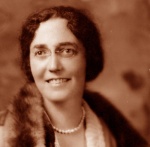 Suffragist Adelina “Nina” Otero-Warren (shown above) is well known for lobbying for the 19th amendment and using her family’s position and contacts to get to the right people so that the New Mexico state legislature would ratify the 19th amendment in 1920.
Suffragist Adelina “Nina” Otero-Warren (shown above) is well known for lobbying for the 19th amendment and using her family’s position and contacts to get to the right people so that the New Mexico state legislature would ratify the 19th amendment in 1920.
August 2012 centennial programs in northern New Mexico celebrating Women’s Equality Day focused on Otero-Warren with a dramatic and spirited interpretation by Carmen de la Luz Luna Randall in two programs entitled “¡Mujeres Presente! New Mexico Women Who Rocked the Vote.”
The program not only highlighted New Mexico’s suffrage history, but it also opened up the program to area residents for them to share oral histories of how the movement impacted their families and the broader communities. Beaulah H. Sandoval, shown here, spoke about her great-grandmother Margarita Salazar Pacheco, who was not only involved in getting the vote, but also using it to its full capacity. Local politicians sought out her great-grandmother, Beaulah Sandoval said, and they preferred her input over other members of the family.
 Women in northern New Mexico weren’t shy and retiring, Ms. Sandoval continued. Both Hispanic and Native American women were independent and “willful,” much more so, she emphasized, than many of their Anglo counterparts.
Women in northern New Mexico weren’t shy and retiring, Ms. Sandoval continued. Both Hispanic and Native American women were independent and “willful,” much more so, she emphasized, than many of their Anglo counterparts.
Why then was the franchise so late arriving in New Mexico when so other western states delivered the vote to women long before 1920? Because New Mexico, which became a state in 1912, stipulated in its constitution that to change it required a three-quarters vote from each county. And in a large rural state, this proved to be an overwhelming challenge. But it wasn’t because New Mexico women were in their husbands’, brothers’ and fathers’ shadows. Another consideration was cultural, in that voting was new on the frontier.
For more information on New Mexico suffrage programs.
Photo of Beaulah H. Sandoval by Audrey Connelly.